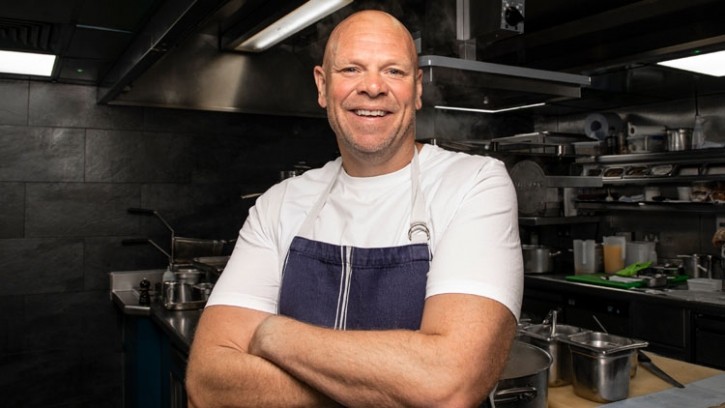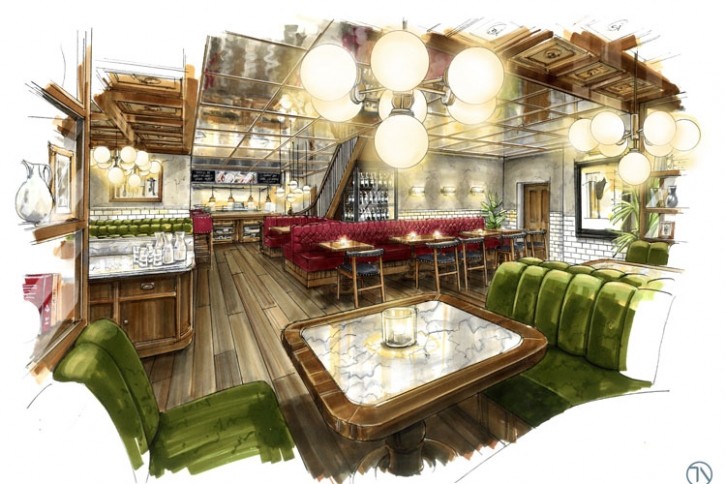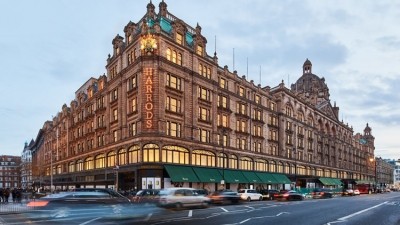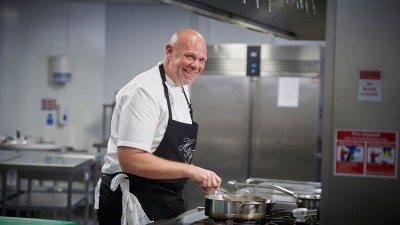“It's not going to be a destination restaurant, just a bloody good pub” - Tom Kerridge on The Butcher's Tap Chelsea

You’re preparing to open your first Butcher’s Tap & Grill in London, what can you tell us about it?
It’s a beautiful corner site just off the King’s Road in Chelsea, opposite the Saatchi Gallery and close to Sloane Square. There used to be a pub there, but it’s been shut for several years. We’re opening it under our Butcher’s Tap brand, which also has a site in Marlow, and like that space this has been designed as a pub. It’ll be predominately wet led, but there will be food served in takeaway containers. And there’s no bookings. We just want to build a lovely, buzzy, busy space. I love what pubs do; they‘re the heart and soul of British communities. Even now as a non-drinker, I love them – the noise, the energy, the sense of belonging – but running one is difficult. Long gone are the days when the landlord could open at 11:30am, turn the fruit machines on and be busy through to closing. I’m not doing this because it’s a business proposition that’s going to make money. I fell in love with the building when I was first shown it. I wish I hadn’t because it’s cost an absolute shedload to put right, but now I just want to open and have fun with it.
Had you been looking to open something else in London?
I didn’t have a massive appetite to open another place in London, and I really didn’t want to open another restaurant. Restaurants must be personal; they can’t be designed to be replicated. The thing with The Butcher's Tap in Marlow is it’s a local’s place. People come for a steak and to watch the sport, and that’s what a pub is all about. I wasn’t looking for one in London, but then something encouraged me to look around the site and here we are now. It’s not going to be a destination restaurant, it’s just going to be a bloody good pub. I want it to be the sort of place everyone wishes was around the corner from them.
What can guests expect from the menu?
The food menu is going to be very simple - just steaks and burgers. Maybe there’ll be some lamb chops and a chicken breast on there, too. As for the drinks, it’s going to be a lot of real ale and draft larger, plus spirits and new world wines. I’m not looking to reinvent what a pub is. There’ll be some craft ales, but it won’t be a focus for us. London has plenty of brilliant places that specialise in those beers, and we just want to be a nice boozer.
It's been five years since you first arrived in London with the launch of Kerridge’s Bar and Grill in the Corinthia Hotel. How do you reflect on that?
It’s been absolutely mental. We had a brilliant opening. Then we were hit with the pandemic, which was an absolute nightmare, and since then there’s been all the other pressures too. The restaurant industry right now is very difficult. It’s not buoyant with loads of people making money. It was a busy summer in the city in terms of tourists, but the spend wasn’t there. That’s compounded by the rise of back-end costs, which means we find ourselves facing a very difficult business model. For me, though, it’s also really exciting. I’ve worked in this industry for 32 years and you go through periods like this that you’ve never seen before, and it’s all about how you get through to the other side.
You’ve just relaunched Kerridge’s Fish & Chips in Harrods. How has that concept evolved since you first opened?
It’s slowly grown and changed. The menu is tighter. We’ve got rid of the desserts and put in a Mr Whippy machine instead that will always serve two or three flavours. Ultimately, we’ve learnt that it doesn’t matter what you put on the menu, it’s the fish and chips people come for so our focus is making sure it’s the best they can buy.
At the end of last year you closed The Bull & Bear in Manchester. What are your learnings from that experience?
The first thing is if you’re going to fail, fail fast. Make that decision quickly and don’t draw it out. It’s so hard to say because the restaurant opened with such a bang, but the pandemic had such an impact. We were battling all the elements put in front of it and got to the point where it had battered us enough, and that’s when we had to walk away.
Is there any appetite for further regional expansion in the future?
I’ve got no reason for expanding at all at the minute, but then I have no reason for opening in Chelsea. If something comes up, we’ll explore it and consider it. Would we open in Manchester? Yes, absolutely, if the right opportunity comes about. We would open anywhere if the right thing were there, but we have absolutely no appetite for growing. We’re opening the London pub at what people would probably say is the wrong time. Like most businesses, it’s a case of battening down the hatches and getting through, but I’m not against expansion. It would have to be more concept led, though, rather than a singular operation.
You’ve been criticised in the press over your prices. Why do you think that is?
In terms of media perception, I am truly rooted in where I come from. I’m a working-class bloke from Gloucester who was raised in a single-parent family. So they question how I can charge £35 for fish and chips in Harrods; and the answer is because that’s what it costs. It’s obviously not going to be the same price as a local takeaway on the high street because of the product we serve. We buy the best produce and that costs a lot of money. It’s the same at The Hand & Flowers. I accept that it’s the most expensive pub in the country by a long way, but as a two Michelin star establishment it’s marginally cheaper than most of the others, and that’s despite the produce being just as good; the staff being just as excellent; and the level of cooking being just as high. No one compares us to that, though, they compare us to other pubs where the prices are obviously much lower.
Do you feel a responsibility to inform people about the realities of pricing in restaurants?
It’s not my responsibility, but I do feel responsible as someone who has a voice to represent my industry when it’s under pressure. Every time I talk about energy prices going up 400%, or vegetable oil going up 200%, if someone begins to understand it and why their local takeaway has had to raise their prices then that’s great. It helps give a voice to those who don’t have one.
The hospitality sector is facing numerous challenges right now, what should the Government be doing to help businesses?
There are several things. Brexit is a big problem and freedom of movement rules need to be reassessed to help us tackle the staffing crisis. But the biggest way to help the industry right now is a reduction of VAT. The Government needs to bring it in line with the rest of Europe. We saw when it was reduced during the pandemic that many businesses breathed a sigh of relief as it meant they could survive. Right now, every hospitality business feels like it’s getting crushed, and that pushes people away from wanting to invest in it and open their own business. We’re already seeing people leave the industry at an alarming rate, and if things don’t change, we’re going to lose a generation of restaurateurs.

![Main_Dining_KB&G[1]](/var/wrbm_gb_hospitality/storage/images/media/images/main_dining_kb-g-1/6171228-1-eng-GB/Main_Dining_KB-G-1.jpg)




















